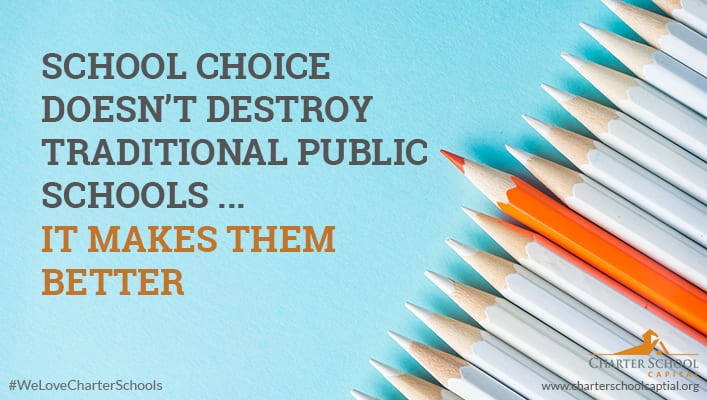
Editor’s Note: With the anniversary of our nation’s independence next week, I thought that addressing the idea of freedom, and more specifically freedom of choice in education was a timely topic. We understand the flexibility in the educational curriculum that public charter schools offer needs to be balanced with accountability. But there has been much debate over the effect that public charter schools have on traditional public schools. This article takes a closer look at the benefits of school choice. It also shows that no evidence or study exists supporting the argument that public charter schools harm traditional public schools. But rather, evidence has been shown to the contrary: the existence of public charters has often improved traditional public school performance in those communities.
We think it’s vital to keep tabs on the pulse of all things related to charter schools, including informational resources, and how to support charter school growth. We hope you find this—and any other article we curate—both interesting and valuable. Please read on to learn more.
*This op-ed article on the benefits of school choice was originally posted here on February 28, 20118 by the Desert News and written by Teresa Mull (tmull@heartland.org), a research fellow in education policy at The Heartland Institute.
School Choice Doesn’t Destroy Traditional Public Schools; It Makes Them Better
The go-to mantra of many traditional government school advocates is that education-choice programs destroy neighborhood public schools. Their argument is flawed for a couple of reasons. The first is it shouldn’t matter if traditional public schools go the way of the dodo if children, despite public schools’ demise, are receiving a better education. And then there is the fact that their argument is simply not true.
The presence of education-choice options doesn’t “destroy” public education, but it does make existing government schools step up their game, as Sarah A. Cordes wrote in a recent EdNext study titled “ Charters and the Common Good.”
She wrote, “I find that students in district schools do better when charters open nearby: Students in these schools earn higher scores on reading and math tests and are less likely to repeat a grade. The closer the schools, the larger the effect: Co-location increases test scores by 0.08 standard deviations in math and 0.06 in reading.”
The effects are modest, as Cordes noted, but what’s equally important in the school-choice debate is that charters have “no significant negative effects on student performance at district schools nearby,” and “it may be beneficial (and certainly not harmful) to allow for further expansion in NYC.”
Cordes concluded that her findings “show that communities can expand charter schools to meet growing demand without putting district schools at risk of instability or failure. Far from an existential threat to their district-school neighbors, public charter schools can benefit not only their own students but also those in other programs down the street — or hallway.”
Cordes’ findings are a great boon to the education-choice debate. The more policymakers, and constituents who try to persuade them, are armed with evidence showing school choice works, the more likely it is good policy will come into being, right? To quote Ernest Hemingway, “Isn’t it pretty to think so?”
The reality is the free-market system of school choice has always had research on its side. EdChoice.org reported, for instance, “Thirty-one empirical studies (including all methods) have examined private school choice’s impact on academic outcomes in public schools. Within that body of research, 29 studies find that choice improved the performance of nearby public schools. One study finds no significant effects. To date, no empirical study has found that school choice harms students in public schools.”
What’s more, “The research shows that students in school-choice programs attend more integrated schools than their public school counterparts,” EdChoice reported.
There goes the false “School choice only benefits high-income, white families” narrative public school proponents have been peddling for decades. After all, how could a system that forces students to attend the school that corresponds with their ZIP code do anything but segregate by income level? The U.S. Government Accountability Office reported in 2016 that segregation in America’s public schools has actually increased in recent years.
Education choice is good for society. That’s not news to those of us who have been paying attention to the school-choice debate in recent years, and it’s no surprise that the educational elite, who remain committed to their plan to control education for everyone in America, would propagate myths about education choice to maintain their power, prestige and hefty incomes. But studies like Cordes’ are nevertheless vital for growing the school-choice movement.
The more school choice we have, the more evidence there will be supporting its value to society, and pretty soon, we’ll have so much overwhelming proof that even teachers unions and the politicians they control won’t be able to ignore it any longer.
Charter School Capital is committed to the success of charter schools and has solely focused on funding charter schools since the company’s inception in 2007. Our depth of experience working with charter school leaders and our knowledge of how to address charter school financial and operational needs have allowed us to provide over $1.6 billion in support of 600 charter schools that educate 800,000 students across the country. For more information on how we can support your charter school, contact us!